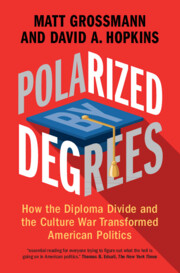Book contents
- Frontmatter
- Dedication
- Contents
- Inspiration and Acknowledgments
- 1 Introduction: Changing Parties in a Changing World
- 2 How Educated Liberals Are Winning the Culture War
- 3 “Hope and Change” Meets “Make America Great Again”
- 4 The Rise of the Diploma Divide in American Elections
- 5 Trust the Institutions, or Burn Them Down?
- 6 Fighting “Woke Capitalism”: The Republican Rebellion against Corporate America
- 7 Are Policymakers Solving Problems or Imposing Values?
- 8 Conclusion: Why Everything Is about Politics Now, and Politics Is about Everything
- List of Figures
- Notes
- Index
3 - “Hope and Change” Meets “Make America Great Again”
Published online by Cambridge University Press: 05 September 2024
- Frontmatter
- Dedication
- Contents
- Inspiration and Acknowledgments
- 1 Introduction: Changing Parties in a Changing World
- 2 How Educated Liberals Are Winning the Culture War
- 3 “Hope and Change” Meets “Make America Great Again”
- 4 The Rise of the Diploma Divide in American Elections
- 5 Trust the Institutions, or Burn Them Down?
- 6 Fighting “Woke Capitalism”: The Republican Rebellion against Corporate America
- 7 Are Policymakers Solving Problems or Imposing Values?
- 8 Conclusion: Why Everything Is about Politics Now, and Politics Is about Everything
- List of Figures
- Notes
- Index
Summary
The biggest change in the party coalitions since the 1980s has been the movement of high-education whites into the Democratic Party and the defection of low-education whites to the GOP. Drawing on evidence from opinion surveys, election returns, and demographic data, Chapter 3 documents the parties’ changing voters and geographic constituencies. These trends continued in the 2020 election despite Democratic efforts to reverse the party’s declining popularity among noncollege whites, with some signs educational divides will spread to other racial and ethnic groups. Candidates, activists, political appointees and staffers, judges, party leaders, and campaign workers all demonstrate the same increasing divisions as rank-and-file voters. Democrats may suffer electorally because the Electoral College and apportionment of the Senate grants noncollege whites disproportionate voting power, but college-educated citizens punch above their weight in other forms of influence: as thought leaders, interest group activists, educators, media figures, scientific experts, candidates, political professionals, lawyers, and financial donors.
- Type
- Chapter
- Information
- Polarized by DegreesHow the Diploma Divide and the Culture War Transformed American Politics, pp. 76 - 120Publisher: Cambridge University PressPrint publication year: 2024

